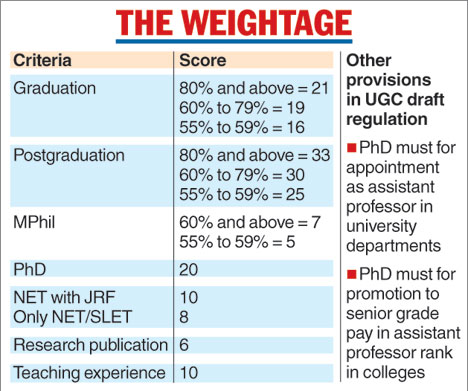
New Delhi: The University Grants Commission has given more weightage to graduation scores than doctoral degrees in draft norms the higher education regulator has unveiled for hiring teachers in colleges and universities.
A candidate with 80 per cent marks in graduation stands to get 21 weightage points while applying for an assistant professor's post in a college.
The weightage is one point more than what a candidate will get for having a PhD degree.
Some academics called the norms "regressive" and "biased" against the poor after the commission uploaded the UGC (Minimum Qualifications for Appointment of Teachers) Regulations, 2018, on its website last week and sought feedback.
They said candidates from rural or disadvantaged backgrounds don't often perform well in their graduation and might be affected by the proposed selection formula.
By laying down a uniform formula for all the 800-odd universities and 40,000 colleges in the country, the UGC has also waded into selection nitty-gritty that had always been left to the universities to decide.
The draft rules have made a PhD degree mandatory for the post of associate professor in all institutions. It has also made PhD qualification a must for appointment of assistant professors in university departments from July 2021 in addition to qualifying the National Eligibility Test (NET) or the State Level Eligibility Test (SLET).
In colleges, assistant professors need to have a PhD if they want promotion to a higher pay scale with the same rank after July 2020.
Under the existing policy, a PhD degree is a must only for those applying for a professor's post.
The draft policy seeks to lay down uniform norms on how selection panels can shortlist for interviews candidates who apply for an assistant professor's post in colleges and universities (see chart).
The selection panel will award scores based on academic records. But whether a candidate is finally hired or not will depend entirely on his or her performance in the interview.
So far, each university had its own norms. Banaras Hindu University, for example, allowed candidates with a first division throughout their career to appear for selections.
Jawaharlal Nehru University looks for candidates with PhDs and their publications, while Delhi University follows a 50:30:20 formula in terms of weightage to career, research and teaching experience.
Bikramaditya Kumar Choudhary, a teacher at the Centre for Study of Regional Development at JNU, said students from rural or disadvantaged backgrounds might be affected under the proposed norms.
"There is class bias in this regulation. It is regressive. Experience shows that rural and disadvantaged students do not score very high in Class XII and graduation. This is evident from the admission cut-off of DU," he said.
DU Teachers Association president Rajiv Ray said the new rules would also affect those who graduated over a decade ago. "Students then were not able to score high marks. Now evaluation has become liberal," Ray said.
The draft norms say PhD degree-holders from a university that figured among the top 500 in World University rankings (at any time) by Quacquarelli Symonds, the Times Higher Education and the Academic Ranking of World Universities of the Shanghai Jiao Tong University (Shanghai) would be eligible to appear directly for the interview for assistant professor.
The norms seek to create a new post of senior professor who will be selected based on publications in peer-reviewed/UGC-listed journals.
For disciplines like yoga and fine art, the draft regulations have waived the requirement for a formal qualification to appear for the interview.
"An outstanding professional, with established reputation in the relevant field, who has made significant contributions to the knowledge in the concerned/allied/relevant discipline to be substantiated by credentials," it said.
Sujit Kumar, who teaches at Ambedkar Colleges under DU, said such open-ended norms for appointment of professors in yoga and fine arts might be misused. "People with dubious credentials will be able to be recruited," Kumar said.
Under the code of professional ethics, teachers should refrain from inciting students against other students, colleagues or the administration.
Ray, the DU teacher, said this provision could be used against teachers for protesting against government policies.











